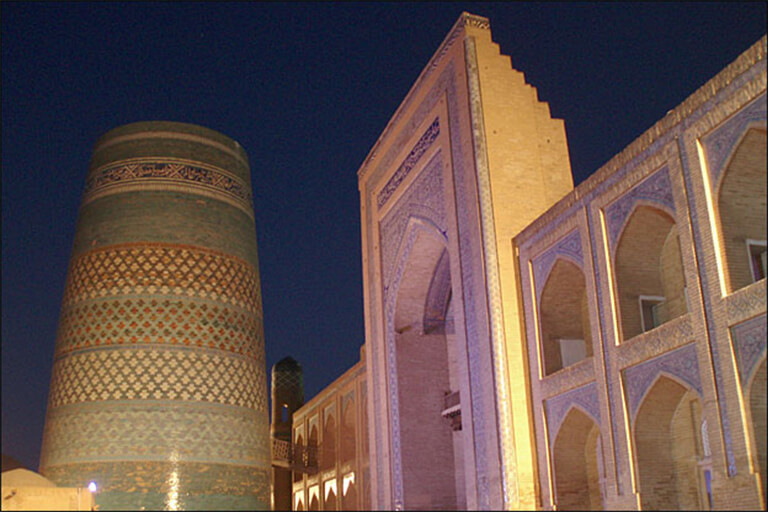Muslim Voices — Uzbek

Audio transcript:
0:00:06:>>MANAF BASHIR: Welcome to "Muslim Voices." I'm your host, Manaf Bashir.
0:00:10:(MUSIC PLAYING)
0:00:12:>>MANAF BASHIR: Almost 90% of Uzbekistan's population is Muslim, but the religion hasn't always been practiced freely there. Uzbekistan is a former member of the USSR. During the Soviet era, few Uzbeks openly practiced Islam, and those that did tended to be older. Things have changed, though, since the country gained its independence in 1991. A large portion of the population attends mosque. Young people are beginning to embrace Islam. And some woman are even beginning to wear hijab. Indiana University's Malik Hodjaev is from Uzbekistan. He spoke with Rosemary Pennington about Islam in his home country.
0:00:51:>>MALIK HODJAEV: During the Soviet time, many mosques were used as storage places, libraries, factories, offices. Atheistic propaganda was strong. Only a few mosques were open to the public. But Muslims could still pray at home. The Muslim population faced difficulties and obstacles in giving an Islamic education to the young generation. Only parents and grandparents in the family could teach your kids to practice their faith. During Ramadan, the school administration could call the students who are fasting to the office and force them to eat. But Muslim customs and traditions in funeral ceremonies, weddings, circumcision and other family practices were followed.
0:01:48:>>ROSEMARY PENNINGTON: Was there any kind of retaliation by the Soviet regime against people who went to mosque?
0:01:55:>>MALIK HODJAEV: If a young boy was to accompany his father or grandfather to the mosque, the adults and the school administration could face punishment as severe as losing their jobs. If the person who went to mosque held a higher position or was a member of the Communist Party, they would be punished more harshly. Retired people, however, had no problem even if they had been in higher position.
0:02:26:>>ROSEMARY PENNINGTON: Uzbekistan was one of many countries that left the Soviet bloc in the early '90s. Did the country gaining its independence change the practice of Islam in the state?
0:02:36:>>MALIK HODJAEV: Yeah. I can say yes. The situation changed completely. Right after gaining independence, thousands of new mosques have been built all over the Uzbekistan. The old mosques were restored. The president of Uzbekistan, Islam Karimov, made to - the Hajj to Mecca. Islam was considered as a part of the cultural identity of the Uzbek people. Many religious schools were opened in the mosques. Also, some people opened private religious schools from their home. Many parents wanted their kids to be familiar with Koran.
0:03:13:>>ROSEMARY PENNINGTON: How has the ability to practice Islam out in the open changed Uzbek society?
0:03:21:>>MALIK HODJAEV: Islam University has opened in Tashkent, where thousands of students are studying religion. It has been a national holiday. Religious programs are broadcasted on TV, especially during the month of Ramadan. And religious movies are shown every day. Religious journals and newspapers are also being published. In addition, translation of Koran and other religious book were published. For instance, during the Soviet period, only higher positioned religious officials could visit Mecca. Now, every year, thousands of people are allowed to go to Mecca. Nowadays, throughout the country, but especially in Fergana, really, you can see young girls wearing the hijab.
0:04:10:>>ROSEMARY PENNINGTON: What's the relationship between Uzbek government and Islam like?
0:04:16:>>MALIK HODJAEV: The constitution of Uzbekistan provide this religious freedom. However, government has some regulations in place, such as mosques have to be registrated (ph) in order to function. Imams are appointed by the government officials. But the situation was complex, especially in '90s. Uzbekistan borders with Afghanistan and Tajikistan, where the rise of Islamic fundamentalism caused conflict. As a result of the violent incidents in the past - explosions in Tashkent in 1999, Andijan events in May 2005 - the government fears an increase of the extremist and violent Islamic groups and has taken measures to increase regulations and curb their influence.
0:05:10:(MUSIC PLAYING)
0:05:16:>>MANAF BASHIR: Malik Hodjaev is a lecturer of the Uzbek language at Indiana University. This has been "Muslim Voices," a production of Voices and Visions in partnership with WFIU Public Media from Indiana University. Support for "Muslim Voices" comes from the Social Science Research Council. You can subscribe to our podcast in iTunes or join the discussion on our website. Find us online at muslimvoices.org.
0:00:00:(MUSIC PLAYING)


 IU Global
IU Global